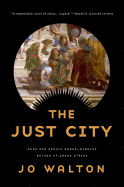
When the Greek god Apollo is rejected by the nymph Daphne, his burning question is why she turned herself into a tree to avoid mating with him, which leads him to seek the wise council of his sister, Athene. Her reply makes Apollo wonder what it would be like to be mortal, and he has an opportunity to find out in an experimental city Athene is building on the island of Atlantis.
Athene has decided to follow the mandates set out in Plato's Republic; her Just City will be filled with 300 men and women who have prayed to her for guidance, all from different time periods, and more than 10,000 children rescued from slavery and orphanages. The masters and children will follow Plato's rules, aided by robots that do most of the menial tasks of running the city. What unfolds in Jo Walton's The Just City is a rewarding and challenging philosophical delight. Walton (My Real Children) establishes a revolving cast of characters who all present their perspectives on city life in first person. She capably explores the aspects of being human and mortal versus being a god or a robot, and the question of free will is carefully considered, as everyone in the city is encouraged to become the best they can be. While philosophers will find much to treasure in this fantastical utopian experiment, even those unfamiliar with Plato or the Greek pantheon will likely find this entertaining. --Lee E. Cart, freelance writer and book reviewer

